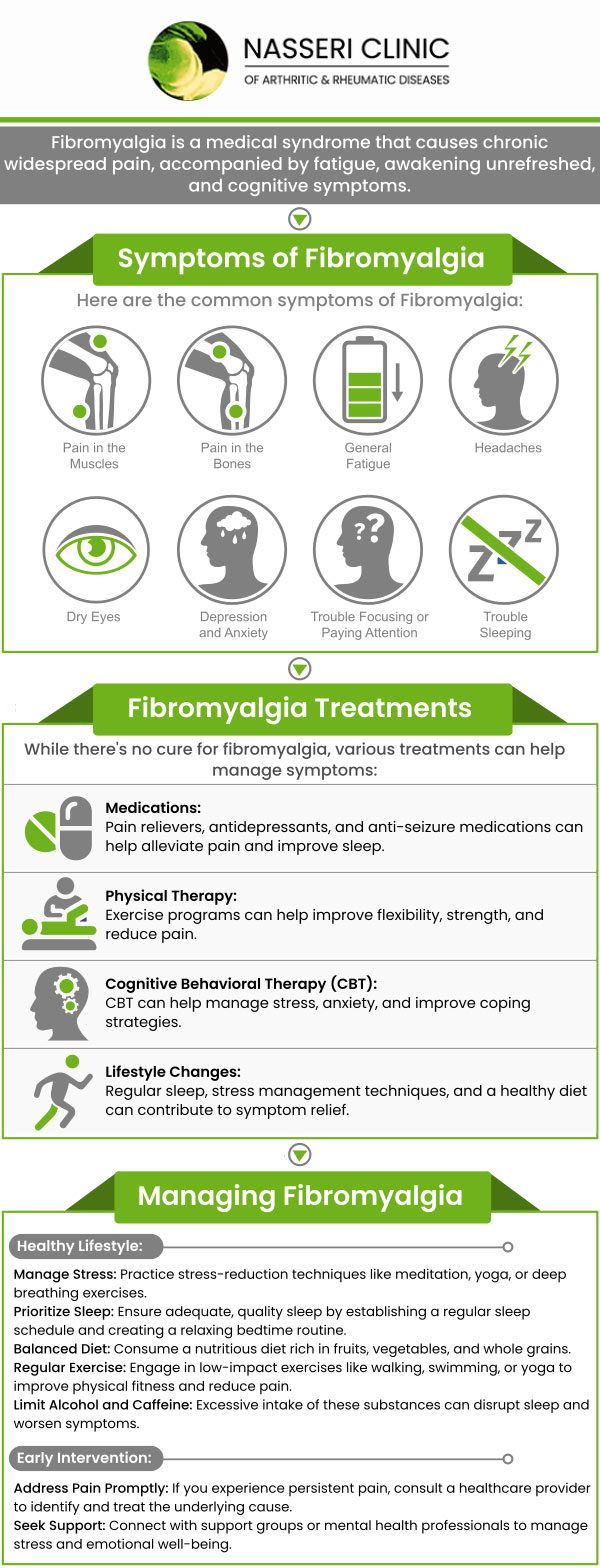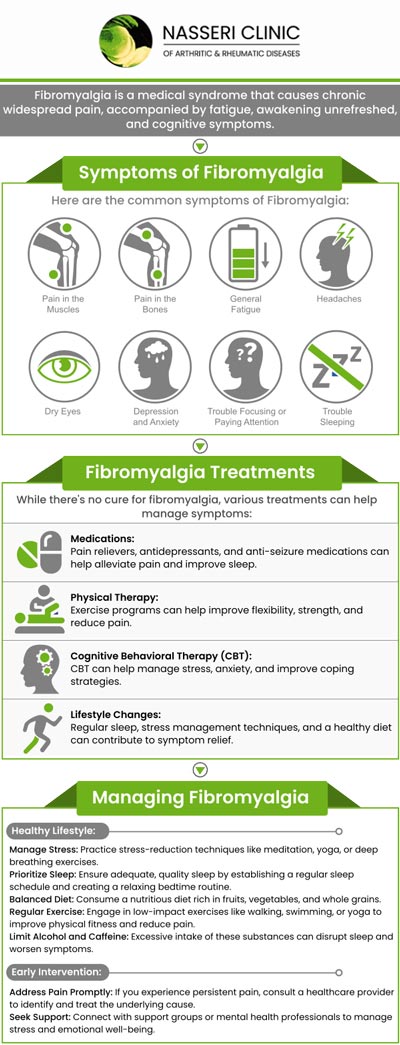Fibromyalgia Treatment Specialist in Catonsville, Glen Burnie, Columbia, North Baltimore, Rosedale, and Edgewater MD
Fibromyalgia is a long-term condition marked by widespread pain in the muscles and bones, accompanied by fatigue, sleep problems, and often emotional and mental distress. Diagnosing fibromyalgia typically requires evaluating symptoms and excluding other potential causes. Treatment usually centers on managing pain, implementing lifestyle modifications, and providing psychological support. For comprehensive fibromyalgia care, consult Dr. Nasser Nasseri, MD, and our skilled team to improve your quality of life. For more information, contact us or book an appointment online. We have convenient locations to serve you in Catonsville, Glen Burnie, Columbia, North Baltimore, Rosedale, and Edgewater, MD.




Table of Contents:
What is fibromyalgia?
Who is affected by fibromyalgia?
What causes fibromyalgia?
What are the four stages of fibromyalgia?
Fibromyalgia is a chronic disorder characterized by widespread musculoskeletal pain. This condition can cause symptoms such as fatigue, sleep disturbances, memory issues, and mood swings. It is a complex syndrome that affects the way the central nervous system processes pain signals, amplifying painful sensations.
Diagnosing fibromyalgia can be challenging as its symptoms overlap with many other conditions. There are no specific laboratory tests for fibromyalgia; diagnosis is based on the patient’s medical history, a thorough symptom assessment, and ruling out other possible conditions.
While there is no cure for fibromyalgia, various treatments can be used to manage symptoms, such as pain relievers, antidepressants, and anti-seizure drugs. In addition, non-drug therapies such as physical therapy, occupational therapy, and cognitive behavioral therapy can also be beneficial for managing fibromyalgia.
Fibromyalgia can affect people of all ages, including children, but certain groups are at higher risk of developing it. Around 2 to 4% of the global population is diagnosed with fibromyalgia, with a higher prevalence among women, particularly those between the ages of 30 and 50.
Women are diagnosed with fibromyalgia significantly more often than men, likely due to hormonal differences, although the exact reasons are still unclear. While fibromyalgia can occur at any age, it is most commonly diagnosed in middle-aged adults, with the risk increasing as people get older.
The exact origin of fibromyalgia is unclear, but a mix of genetic, environmental, and psychological factors is believed to contribute to its onset. As the condition tends to run in families, there are likely certain genetic mutations that make people more susceptible to developing fibromyalgia. In addition, individuals with rheumatic diseases, such as lupus or rheumatoid arthritis, are at a higher risk of developing fibromyalgia due to chronic inflammation.
Furthermore, physical or emotional trauma, such as injuries, surgeries, or significant psychological stress, can trigger the onset of fibromyalgia. Patients diagnosed with other chronic conditions, like irritable bowel syndrome (IBS), chronic migraines, interstitial cystitis, or chronic fatigue syndrome, are also at higher risk of fibromyalgia.
Research suggests that people with fibromyalgia have an abnormal response to pain stimuli, likely due to changes in the way the brain and spinal cord process pain signals. This heightened pain sensitivity may be triggered by various factors, including infections, physical or emotional stress, and chronic health conditions.
Fibromyalgia can be categorized into different stages based on symptom progression and its impact on the body. The four stages are:
• Regional fibromyalgia – In this early stage, symptoms are localized to specific areas of the body. Pain and tenderness may occur in specific areas, such as the neck, shoulders, or lower back. In this stage, it’s common to experience occasional stiffness and mild fatigue. Symptoms are usually intermittent and may be mistaken for overuse injuries or stress-related discomfort.
• Generalized fibromyalgia – As the condition progresses, fibromyalgia pain becomes more widespread, affecting multiple areas of the body. This stage is commonly characterized by persistent pain along with increased fatigue and sleep disturbances. In addition, cognitive issues, often referred to as “fibro fog,” become more noticeable, affecting concentration and memory.
• Advanced fibromyalgia – In the third stage of fibromyalgia, symptoms become severe, impacting nearly every aspect of daily life. Pain is widespread and constant, and fatigue is debilitating. It’s common for symptoms to significantly affect sleep and worsen fatigue at this stage.
• Secondary, reactive fibromyalgia – This type of fibromyalgia develops as a secondary condition in response to another underlying health issue, such as an autoimmune disease, infection, or physical trauma. The symptoms of fibromyalgia overlay the primary condition, often complicating diagnosis and treatment.
If you have fibromyalgia, it’s important to work with a specialist to manage your symptoms and prevent your condition from worsening and significantly affecting your general wellness. To get started with comprehensive fibromyalgia management, schedule an appointment at Nasseri Clinic of Arthritic and Rheumatic Diseases.
Effective management of fibromyalgia requires a holistic approach that includes pain relief, lifestyle adjustments, and emotional support. Our dedicated team is here to provide personalized treatment plans to help you navigate this condition and improve your overall well-being. Contact us today or make an appointment online to start your journey toward a healthier, more comfortable life. We serve patients from Catonsville MD, Glen Burnie MD, Columbia MD, North Baltimore MD, Rosedale MD, Edgewater MD, Hebbville MD, Woodlawn MD, Pasadena MD, Jacobsville MD, Ellicott City MD, Laurel MD, Dundalk MD, Halethorpe MD, Overlea MD, Parkville MD, Riva MD, Annapolis MD, Ferndale MD, and surrounding areas.
Check Out Our 5 Star Reviews


Additional Services You May Need

Additional Services You May Need
▸ Arthritis Care
▸ Infusion Therapy
▸ Lab Services
▸ Radiology
▸ NCARD NRACE
▸ BioFlex Laser Therapy
▸ Ultrasound Guided Injection
▸ NCARD PRP
▸ NCARD Myers
▸ Rheumatology
▸ Myositis
▸ Osteoporosis
▸ Ulcerative Colitis
▸ Multiple Sclerosis
▸ Saphnelo Infusion
▸ Injection Treatments
▸ Intravenous Immunoglobulin Therapy
▸ Asthma
▸ Crohn’s Disease
▸ Fibromyalgia
▸ Infusion Therapy for Gout
▸ Inflammatory Eye Disease
▸ Inflammatory Skin Disease
▸ Vasculitis
▸ Iron Deficiency
▸ Lupus


